![]()
The Words of the Futila Family
|
|
The Words of the Futila Family |
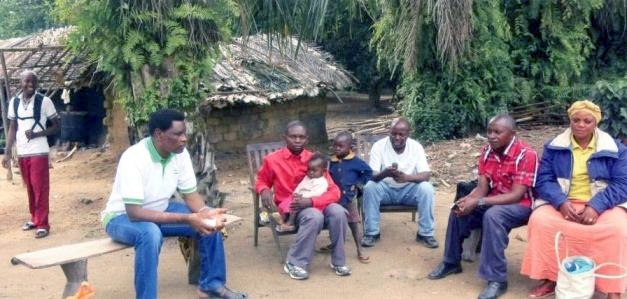
Rev.
Futila Di Mayeko Michel, national leader of the Democratic Republic
of Congo, in an isolated area of the nation meeting with members that
maintain their faith despite never having met True Parents.
The Democratic Republic of Congo (DR Congo) is located in central Africa. It is the second largest African country after Algeria and is surrounded by nine neighboring countries.
Filled with 9 million inhabitants, the population of Congo comprises more than six hundred ethnic groups and as many spoken languages: a cultural richness.
In addition to the diversity of the population, nature has also endowed DR Congo with great wealth in mineral resources, agricultural produce and sources of hydraulic energy. This potential for fruitfulness confronts the spiritual reality of human beings; that is to say, a bad nature characterized by conflicts, immorality and murder that has brought a repeating cycle of violence and war to Congolese through its leaders, since independence in 1960.
Wars affected mainly the eastern part of DR Congo, principally the northern part of Katanga Province and all of Maniema Province, South Kivu Province, North Kivu Province and Oriental Province.
We held a Universal Peace Federation conference to inaugurate UPF in Kindu, the capital of Maniema Province on December 19. The conference was made possible and was initiated by Mr. Tunda Kasongo Lukali, a local politician that wanted to set up UPF in his electoral stronghold in an effort to resolve the problems produced by years of warfare in the eastern part of the country.
This reality of war has extensively slowed development and has compelled UPF to choose as the conference theme Conflicts in DR Congo: A Challenge for the Realization of the Millennium Development Goals (MDGs).
In excess of a hundred and twenty-five people attended the conference -- religious and political figures as well as social activists, intellectuals and members of the media.
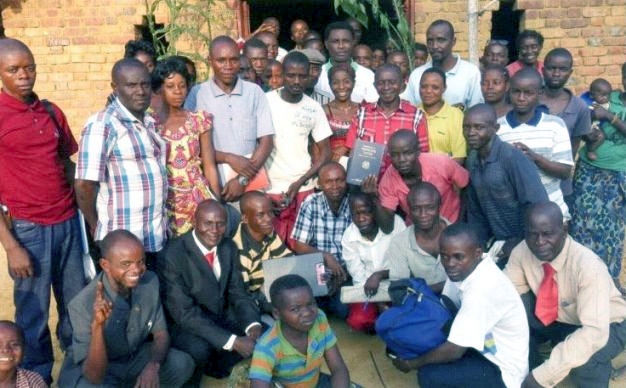
The
fruit of a tribal messiah's efforts; they thirst for the Divine
Principle teachings.
The conference opened with Rev. Futila, the UPF secretary general, introducing UPF and briefly speaking about Father's life.
Three strong points characterized the conference. An ambassador for peace that is an expert in the area of conflicts presented a review of conflicts in the Congo since 1960. His lecture demonstrated how DR Congo has been a theater of conflicts and war ever since it gained independence, pinpointing exploitation of its natural resources as the main reason behind these problems. He explained other causes as well, spoke about the dire consequences of war in DR Congo and made some suggestions.
Then an expert in the Congolese government Ministry of Planning talked about the MDGs in DR Congo, in particular the goal for education. He demonstrated that the balance sheet was decidedly negative.
Finally, Rev. Futila explained the UPF approach to causes of conflicts and gave some suggestions as well. He showed that the causes of conflicts -- individual, familial, national and international -- were in fact only effects. The true source of conflicts is a spiritual one -- the separation of God from the first human beings.
He asserted that true and lasting peace is not possible without God at the center and without applying the principles of restoration to solve conflicts. Ultimately, the main public figure at the conference recognized this truth and developed a new image of True Father's personality. He describes Father as having been a great visionary.
At the conclusion of the conference, we recognized that generally in Africa, and particularly in DR Congo, no problems arise from speaking about God and the Divine Principle during a UPF conference.

Left:
Members are selling $1 bottles of ginger juice to fund a new church,
which they are building, in Kindu; Right: Rev. Futila leads a prayer
for the spirits of those killed through years of war in the eastern
provinces of DR Congo.
As the church leader, Rev. Futila had visited Kindu in the past and had promised he would return. Kalima can be regarded as the nursery of all missions in its province. It is growing and setting a good example for other pioneer efforts. We travelled the hundred and forty kilometers from Kindu to Kamundala on a motorcycle. Over sixty-five kilometers of the way to Kalima was unpaved and the rainy season made it even more difficult. We had a flat tire six times.
Our members in Kindu have decided to build a new church, bigger and more modern than the former one. They are raising funds for the construction by selling ginger juice for a dollar a bottle. Work is progressing slowly but they are determined to achieve completion.
One day, the roof of the church came off in a heavy rainstorm. Technicians advised Kindu church members to tear down the building and restart. One member, however, convinced the pastor that he had an inspired solution that would allow them to move forward with the work without destroying the roof.
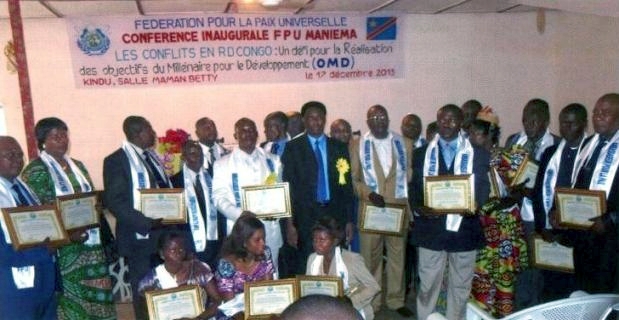
UPF
held a Vision 2020 conference to help spur development in eastern DR
Congo.
Mr. Swedi Lukwabantu is a member of our church in Kalima, which is located in the same province but is a hundred and twenty kilometers northeast of Kindu. After listening to presentations on the Vision 2020 Project in Kindu, he went to his hometown farm in Kamundala, twenty kilometers away from Kalima. There he has witnessed to twenty-five new members and held a two-day workshop.
From Kalima, Rev. Futila went to Kamundala to greet him and to observe firsthand the results of his mission work.
This tribal messiah, Mr. Lukwabantu, was blessed among the 3.6-million-couple group. He has four blessed children. Rev. Futila said, "The atmosphere created by their sincere desire to learn the Divine Principle obliged me to speak for an hour, though I had intended to speak for only ten minutes. For our meeting, they had rented a Methodist Church, larger than our church in Kalima. That the pastor of the church allowed 's to display True Parents' picture rather than one of Jesus surprised me. To encourage these new members to dig deeper into our teachings, we gave a copy of Exposition of Divine Principle to them, and I promised to send more shortly. I have to admit that the enthusiasm and the purity of those members reminded me of my first moments in the DR Congo church."
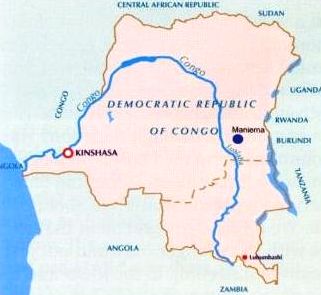
The trip from Kindu to Kalima and Kamundala, took us past many mission churches with blessed families. I stopped in Nyoka, where twenty-four blessed families live and met with the local leader. Even in the most undeveloped corner of the country, True Parents' picture can be found in the homes of our sincere members. Those members have never personally seen True Parents but they remain faithful to them. As Jesus said, "Have you believed because you have seen me? Blessed are those who have not seen and yet have come to believe."'
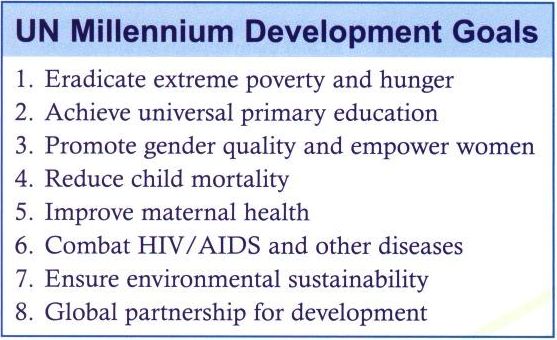
In practical terms, war in DR Congo started in 1994, after the genocide in Rwanda and the massive influx of Rwandan refugees into the provinces of North Kivu and South Kivu. After a certain time, this situation resulted in the Rwandan army crossing into DR Congo in pursuit of those refugees, resulting in the Rwandan refugees (enemies of the Rwandan government's army) moving deeper into DR Congo. The Rwandans pursued them with the support of a Congolese rebel group. As allies they fought both the DR Congo army and armed (as well as unarmed) refugees.
Eventually, the Rwandans toppled the DR Congo's government and installed the Congolese rebel group leader as president. The Congolese rebel group leader, after being made president of DR Congo, ceased cooperating with the Rwandans that had installed him. Not only that, when the Rwandan army invaded again in 1998, he used the Rwandan refugees, sworn enemies of the Rwandan government, to bolster DR Congo's forces in war against the Rwandan army. This opened the door to the protracted war that raged for years afterward. It drew the military forces of Burundi and Uganda to ally with Rwanda and the military forces of Zimbabwe and Angola to ally with DR Congo.
In that many foreign armies fought in a single nation, the war in DR Congo, at least fifteen years in duration, closely resembled a war from the distant past, World War I, which was mainly fought on French soil. It has often been said that DR Congo experienced Africa's first world war.
Overall, including the years before 1998, more than six million DR Congolese have died as the human cost of this conflict. In November 2012, a rebel military movement called M25, took over eastern Congo and set itself up as an illegal government. For a year previous to the takeover, they had already been spreading terror and confusion in that part of the country.
With the victory of the national army and the surrender of M25 in November 2013, the war appears to have ended. Rev. Futila recently said, "Today calm has returned and I'm just coming from Goma myself. Most of the peoples who died there were innocent. Because of that, we organized in four provinces (Maniema, North Kivu, South Kivu and Oriental Province), prayers of consolation for them and also to claim 2014 as a year of peace in order to bring more results for Vision 2020."
We nightly had a twelve-minute condition of sincere and deep prayer with great devotion. After sharing the situation of those people in the spiritual world according to the Divine Principle, we did a prayer to claim 2014. We are determined to work effectively in those four provinces worst affected by the ravages of warfare.
Being a strategic nation is a great privilege, but we also feel a deepening sense of responsibility for our nation. DR Congo members are determined to assume this responsibility. To achieve Vision 2020, constant mobilization and education are necessary for members. Our weak point is the lack of appropriate resources and materials to do our work, such as floodlights, computers, etc. Even today, the church does not have a means of transportation for the activities of the provinces.
We cannot conclude without extending to you, brothers and sisters, our best wishes for the New Year, 2014.